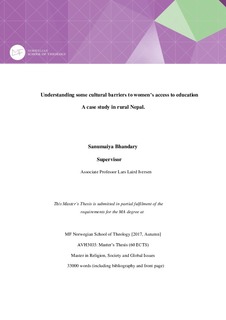| dc.description.abstract | This empirical research carried out in rural area in Nepal, and examines how cultural barriers influence on women’s access to education. This study is based on data collected through interviews with local Nepalese women in rural area of Nepal and is attempting to answer the question: “In what ways might cultural barriers influence Nepalese women’s access to education in rural areas?” A qualitative method was chosen for the study using semi-structured interviews with open-ended questionnaires as data collection methods. The empirical findings have been clarified with nine Nepalese women from rural area in Nepal.
Based on the data from interviews, some cultural barriers influenced women’s access to education. These cultural barriers are as follows: early marriage, caste-based gender discrimination, household work and the high value of a son. It was also found that daughters were not valued by their parents when it comes to educational opportunities because of traditional cultural beliefs and practices in Nepalese society. The findings of this study indicated that early marriage was major problem for women’s access to education in rural area. In this regard, parents held traditional cultural beliefs of early marriage before first time menstruation of their daughters.
On the other problem is household work, since early age, the women in this study were engaged in household work helping the mother in the kitchen and working in agriculture fields. Parents forced their daughters to stay at home and become proficient in household work rather than pursing their education. Likewise, the high value of son and caste- based discrimination also influenced women’s access to education. This thesis discussed and analyzed that these cultural barriers were major challenges and problems for women’s access to education in rural area of Nepal. | nb_NO |
